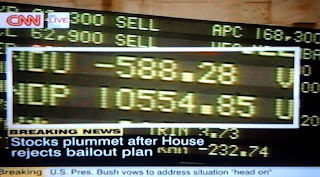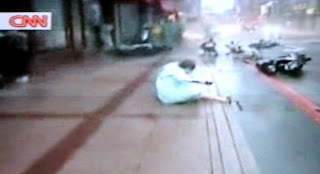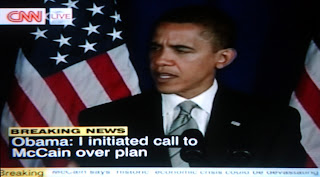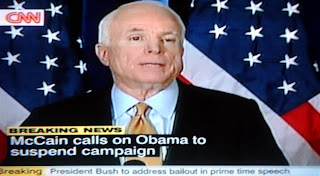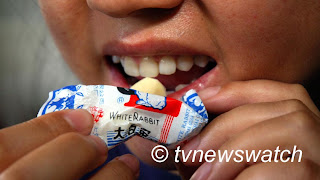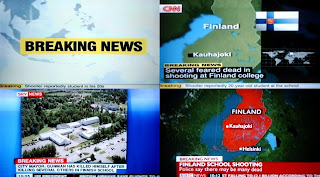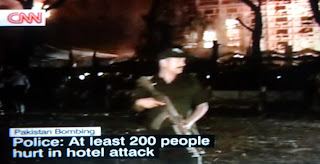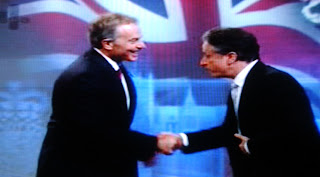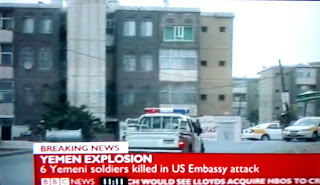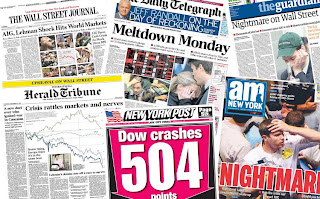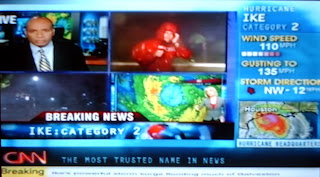
Americans were perhaps glued to there television sets as the two presidential candidates began their battle on the first of three debates. But around the would there was perhaps much less interest. US Election fatigue has already set in throughout the United Kingdom, and few were going to sit up until 4 a.m to watch the rather dry debate that ensued. Following the 90 minute tête à tête there followed the endless analysis by television pundits. Sky’s correspondent rattled off more words in a minute than a speed typist. Perhaps he’d been hitting the coffee a bit hard.
The BBC brought in correspondents from around the world to give their view of what viewers might have thought of the speeches. Hugh Sykes in Baghdad said few would have been watching across Iraq. Well, after all it was dawn and the cock was crowing throughout his report as he fought off swarms of flies. Then to Kabul with correspondent Alastair Leithead. What kind of pointless exercise was this that the BBC were attempting to deliver? Of course, the reporter standing in an army base somewhere in the Agfhani capital may have imparted interesting speculation as to how the country might see changes depending upon which candidate won. But there would have been few interested in the US election throughout Afghanistan and even fewer watching the debate, if indeed it was possible to do. After Kabul the BBC switched their Russia correspondent Richard Glapin. He said the government there might be concerned over McCains forceful words over the recent hostile action in Georgia. Finally to Beijing where there was also little interest from the man in the street. The BBC reporter, James Reynolds, said most Chinese were more interested in China’s current space mission or worrying about the safety of the milk in the shops. Maybe a few officials were paying close attention, but they will only be concerned of issues directly affecting themselves. The fact that China was barely mentioned throughout will be pleasing to the Chinese leadership.
The issues that dominated the first 35 minutes related to the economy. Barack Obama said, “We are at a defining moment in history, our nation is involved in two wars and a financial crisis”. It was a crisis that demanded everyone working together. “We have to move swiftly and wisely” Obama added. But any pan should have “oversight” and the “possibility of taxpayers getting their money back or profit from it” Obama insisted. He then turned the tables on his opponent saying, “This is a result of 8 years” failed policies of the Republican party and George Bush.
McCain also acknowledged the severity of the economic crisis. “Have no doubt about the magnitude of this crisis, the worst such crisis probably in our time. But the point is the Democrats and Republicans are sitting down together” McCain said. “This isn’t the beginning of the end it’s the end of the beginning if we don’t sort out a plan” McCain warned, “But it must have transparency”. On the plan involving $700 billion, Obama said “We haven’t seen the language yet, but I’m optimistic”. But he went onto criticise the “sub-prime lending and the shredding of regulations which got us into this mess”.
McCain interjected, “I also warned about the upcoming problems”.
The two candidates berated eachoyther over their respective tax plans. Obama said that health care systems and energy policies were not working and that corporate tax loopholes should be closes. He said that government spending should also be reviewed and said he would go through it “line by line”. McCain slated Obama’s increasing tax on higher earners and large corporations. McCain said that business tax should be cut to increase competitively and went on to praise the average worker. “I believe in the American worker” McCain said, “Our best days are ahead of us”.
Then it moved onto the war. Again it was all the usual arguments of who said what and when. This was peppered throughout the dialogue with accusations by Obama of bad predictions, a failure to see the outcome, and a lack of planning. McCain defended the move to war and gave a short history of terrorism targeted against the US from the Beirut bombings in the 1980s to the war in Kosovo and the first Gulf conflict.
With regards Iran McCain said the country was a serious threat. “we cannot allow another holocaust” McCain said. “I’ve proposed a league of democracies ... To effect change on the Iranian regime” he continued. Obama’s approach was one of blame. Iran’s strength has grown from the war in Iraq. But he said tougher sanctions were needed but China and Russia stood in the way. Talking, he said, was the way forward. “Senator McCain mentioned Henry Kissinger, who's one of his advisers, who, along with five recent secretaries of state, just said that we should meet with Iran - guess what - without precondition. This is one of your own advisors”.
McCain got quite angry at this point, “I’ve known Henry Kissinger for 50 years and he would not say that the president of the United States would meet with the president of Iran”. Obama retorted that he hadn’t asserted Mr Kissinger had imparted such thoughts. But talks have to starts somewhere he insisted.
In many respects the debate was very dull and dreary. Both candidates looked more than just a little weary, perhaps it was all those flights back and forth from Washington. Throughout many parts of the debate the candidates rambled, stuttered and even fumbled over there words. McCain had trouble with the pronunciation of ‘Ahmadinejad’ and ‘naive’ as at one point there was a definite stutter of nervousness from Obama.
The debate was watch by many people online. Twitter was alive with comments flooding in. Others took part in online chats organised by broadcasters such as the BBC. But the majority of the planet slept through it. They didn’t miss much [
CNN /
BBC /
Sky News].

